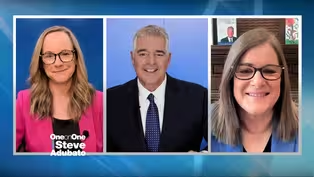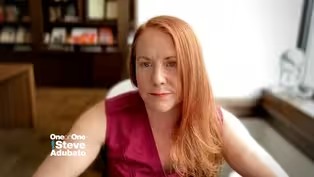One-on-One
How this organization is transforming public spaces
Clip: Season 2025 Episode 2831 | 8m 48sVideo has Closed Captions
How this organization is transforming public spaces
Trent Matthias, Director of the National Fitness Campaign, joins Steve Adubato to explore how the organization’s outdoor Fitness Courts are transforming public spaces into free, accessible gyms for communities in need.
Problems playing video? | Closed Captioning Feedback
Problems playing video? | Closed Captioning Feedback
One-on-One is a local public television program presented by NJ PBS
One-on-One
How this organization is transforming public spaces
Clip: Season 2025 Episode 2831 | 8m 48sVideo has Closed Captions
Trent Matthias, Director of the National Fitness Campaign, joins Steve Adubato to explore how the organization’s outdoor Fitness Courts are transforming public spaces into free, accessible gyms for communities in need.
Problems playing video? | Closed Captioning Feedback
How to Watch One-on-One
One-on-One is available to stream on pbs.org and the free PBS App, available on iPhone, Apple TV, Android TV, Android smartphones, Amazon Fire TV, Amazon Fire Tablet, Roku, Samsung Smart TV, and Vizio.
Providing Support for PBS.org
Learn Moreabout PBS online sponsorship(upbeat music) - We're now joined by Trent Matthias, who's director of an organization called the National Fitness Campaign.
Trent, good to see you.
- Good to see you, Steve.
Thanks for having me.
- You got it, website's up.
What is this campaign all about?
- Steve, this campaign's all about getting Americans moving.
We are great at a lot of things in America, but one of them is maybe not so much designing our communities to be healthy.
And so we help communities all around the country build free outdoor wellness centers supported by major healthcare organizations to make the healthy choice, the easy choice every day for Americans.
- So we're showing some video right now of what these, they're called fitness courts?
- Yes, sir, fitness courts.
- We're showing some video of the fitness courts.
The design, as I understand this, of these fitness courts, matters.
Are they all the same?
- They're all the same, just like tennis courts or basketball courts, and they are designed around seven stations, gives you a full body workout in just seven minutes.
So it's easy to do, no matter your age or fitness level, and they're built in free public spaces.
Every single one is available to communities across America.
- Okay, so where these fitness courts are matters, you have a map behind you of the United States last time I checked.
Do you have designated, Trent, where those fitness courts are there?
- Of course, yeah.
We're tracking, and there's close to 750 participating communities so far in the campaign.
We're just getting started.
The goal is to build about 5,000 fitness courts by 2030 across the country, and on the state of New Jersey, they're growing rapidly with dozens of them being funded and built.
Goal is to, again, see one of these within a 10-minute bike ride of every American to make it easy to stay active.
- Are they disproportionately in urban communities?
- We do focus on population centers, but the good news is every community in America is eligible, so no matter if there's 2,200 people or two million people, the community can have a fitness court.
- So people are on your website now and they want to find out more about the possibility of the prospect of having a fitness court in their community.
How do they go about doing that?
- Absolutely, it's easy to do, Steve.
We've got a contact form and we're certainly looking for civic leaders that are interested in wellness in the community to contact us.
We assist with funding, planning, building, and activating these beautiful free outdoor wellness centers and a lot of the work's made possible by major healthcare organizations like Horizon Blue Cross Blue Shield in New Jersey.
So there's grants available funding to help, and that's what we're here for.
- I'm curious about this.
So these fitness courts, this Fitness Campaign, is it funded by the government at all, or is it all private?
- So it's a public-private partnership and it's grown into one of the largest ones in the country over the last few years.
And so effectively, the municipal partners that we have, they provide part of the funding.
There are healthcare sponsors like Horizon Blue Cross and Blue Shield that also provide part of the funding.
- But some government money from a local, what local governments who have the money to do this?
- Absolutely, Steve, we find that many mayors and civic leaders are beginning to prioritize infrastructure that supports wellbeing, whether it's parks, pedestrian infrastructure like trails and sidewalks, and now outdoor wellness centers that make it free and easy for people who can't afford a gym membership to stay active.
And so, we are able to work with many of those different funding sources and if funding's a little tight, our organization helps raise the rest of the funds to make it happen.
- How'd you get into this?
- I rode my bicycle past the first fitness court next to the Golden Gate Bridge in San Francisco when I moved out here a little over a decade ago, and fitness has always been a passion of mine.
Designing the built environment to make it easier to stay active also crossed over with my studies back at Virginia Tech, and this was a little bit of the right place and the right time for me.
- Are you out on the West Coast right now?
- Yes, sir, San Francisco Bay area.
- Got it.
How much of this for the people you on the National Fitness Campaign serve, Trent?
How much of this is an issue of quote, unquote, "health equity"?
I know people are uncomfortable using the word equity, but this is about access and to some degree equity as it relates to people's wellbeing and fitness.
Is it not?
- It really is, Steve, you know, we do believe pretty strongly that every American should have the ability to get a high quality workout in every day.
It shouldn't be something that you have a barrier to achieve based on your socioeconomic position or the money you have in your bank account, it should be free for you.
- Connect this to, I know there are seven, go back again, Trent, there are seven stations?
- Yes, seven zones or stations on the fitness court.
- Well, I imagine it's not easy.
Again, people can adjust accordingly, but it's physical fitness.
Clearly, though, Trent, connected to our overall wellbeing, our mental health, our emotional wellbeing.
Make that connection, Trent.
- Yeah, absolutely, Steve, you know, I know for me, if I'm outside, if I get to be with a group and I get to move, those three things are extremely important to feeling great.
Obviously there's the physical benefits of getting your heart rate up, building muscular strength, supporting longevity, but more so in this day and age we've gotta be together, the fitness court helps you do that.
And being outside, we know there's so many benefits to being outside, it brings all those things together, which is pretty incredible.
It's quick and easy to do, it's just seven minutes.
- Real quick before I let you go, I'm curious about this.
There are so many people who believe that only certain people are focused on their fitness.
And for some of us, in which it becomes a way of life, it's built in.
Other people are like, "Well, how would I start?
How would I do this?
How would I get involved in a Fitness Campaign?"
Send a message to those folks who don't live it every day the way you do.
- Appreciate that.
You know, I think it starts with something as simple as a choice that starts to turn into a habit.
So every day, Steve, we get to wake up, we get to decide, are we gonna eat this or that?
Are we gonna drive in the car to get to where we're gonna go or are we gonna jump on a bicycle?
You make small choices, they add up to habits, and I'd really encourage everybody to think about if it's something as easy as taking five minutes to get outside, go for a walk around the block or down the street, that one choice can build into a habit and that'll reward you in a pretty big way long term.
So it's kinda what the campaign's all about.
You know, it's what gets me excited to stay motivated to do this work, and that's the important medicine that I think we all need around the country.
- Last question real quick.
How many, again, fitness courts are you talking about?
The goal?
- 5,000 by 2030 and we see a clear path to 10,000 of these, it really ought to be in every community in America.
- That is Trent Matthias, who's director of a really interesting initiative called the National Fitness Campaign.
Trent, wish you and your colleagues all the best, helping others find better health regardless of where they live or quote, unquote, "their ability to pay."
Thank you, Trent.
- Thanks, Steve.
Really appreciate it.
- You got it, I'm Steve Adubato, that's Trent Matthias doing important work.
See you next time.
- [Narrator] One-On-One with Steve Adubato is a production of the Caucus Educational Corporation.
Funding has been provided by Horizon Blue Cross Blue Shield of New Jersey.
Hackensack Meridian Health.
Community FoodBank of New Jersey.
Kean University.
New Jersey Sharing Network.
Johnson & Johnson.
The Turrell Fund, a foundation serving children.
Congress Hall.
A Cape Resorts property.
And by NJM Insurance Group.
Promotional support provided by BestofNJ.com.
And by New Jersey Monthly.
- How long you been waiting?
- About a half hour.
- Brutal.
This keeps up, I'm gonna miss my pickleball game.
- I've been waiting eight years for a kidney.
What can you do?
(gentle music) - [Narrator] Over 100,000 people in the US are waiting for a life-saving transplant.
But you can do your part in an instant.
Register as an organ donor today at NJSN.org.
Michele Adubato dispels myths about vaccines and autism
Video has Closed Captions
Clip: S2025 Ep2831 | 8m 55s | Michele Adubato dispels myths about vaccines and autism (8m 55s)
The role of leadership in the success of nonprofits
Video has Closed Captions
Clip: S2025 Ep2831 | 10m 15s | The role of leadership in the success of nonprofits (10m 15s)
Providing Support for PBS.org
Learn Moreabout PBS online sponsorship
- News and Public Affairs

Top journalists deliver compelling original analysis of the hour's headlines.

- News and Public Affairs

FRONTLINE is investigative journalism that questions, explains and changes our world.












Support for PBS provided by:
One-on-One is a local public television program presented by NJ PBS

